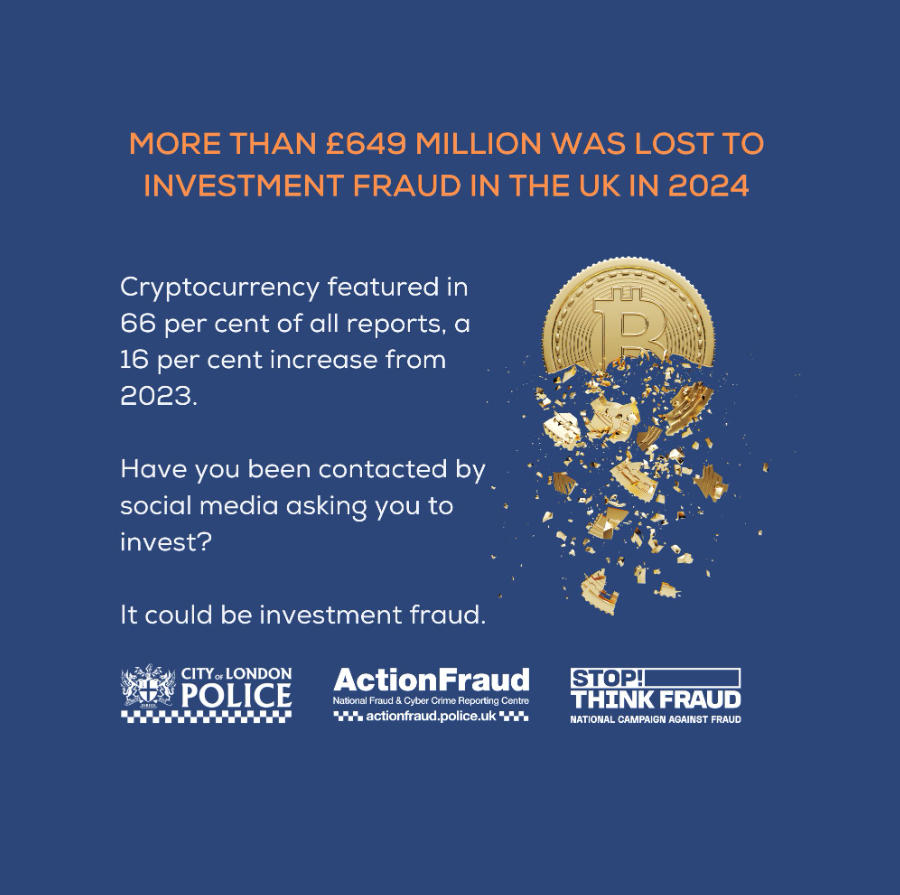- Crypto scams made up 66% of all UK investment fraud in 2024, costing victims over $830 million.
- Social media played a big role in these scams, with WhatsApp, Facebook, and Instagram leading the way.
- Scammers used AI to impersonate celebrities like Martin Lewis and Elon Musk, tricking people with promises of quick money.
Crypto fraud isn’t just growing—it’s exploding. Last year, it accounted for 66% of all investment scams reported in the UK, according to new data from City of London Police and Action Fraud. That’s up a hefty 16% from the year before.
In total? Victims lost a staggering $830 million (about £649 million). And of that, over $549 million (or £428M) was tied specifically to crypto-related schemes.
Social Media’s Role—and Fake Celebs Too
Even though the total number of fraud reports dipped 7% in 2024, the overall financial hit still climbed by 13%. Why? Well, social media’s playing a huge role.
Roughly 36% of all scam reports mentioned platforms like WhatsApp, Facebook, or Instagram—with WhatsApp leading the way at 40%, Facebook at 18%, and Instagram at 14%.
Also wild? About 2% of scams involved impersonating celebrities, often with AI-generated videos. British financial advisor Martin Lewis was the top target (44%), followed by Elon Musk (40%) and Jeremy Clarkson (8%).
“They’ll tell you it’s easy money,” said Det. Supt. Oliver Little. “But it’s rarely that simple. People are being lured in by the promise of quick cash, and they’re getting burned.”
Crypto Fraud’s Global Reach—and Familiar Faces
James Pritchard, a UK lawyer specializing in private prosecutions, told Decrypt he’s seen a clear rise in crypto-related cons. And he says crypto’s “strangeness” makes it easier to believe the unbelievable.
He remembers a case from years ago: a woman clutching a letter from a supposed African prince asking for help with millions. Obvious scam. But with crypto? Not so easy to tell.
“I mean, a guy did once pay 10,000 BTC for pizza,” Pritchard joked. “So, the idea of making insane profits doesn’t seem as crazy anymore.”
What might raise red flags in traditional finance—like wiring money overseas—is just normal in the crypto world. That makes people let their guard down, he says.

Asset Recovery on the Rise, But Still Tough
UK authorities are getting better at clawing back stolen crypto. In one recent case, police recovered £520,000 (~$671,000) from a scam targeting an 80-year-old man. But tracking and prosecuting crypto crimes still isn’t easy.
“The transparency of the blockchain doesn’t mean it’s easy to follow,” said Pritchard. “Tracing wallets is one thing. Getting legal action across borders? That’s another headache altogether.”
And if you think the worst is behind us—don’t bet on it. Chainalysis says crypto scams raked in $12.4 billion globally last year. So 2025 might just see another record-breaking year… for all the wrong reasons.

















